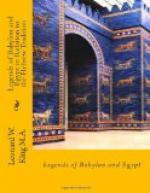(1) See Hilprecht, Babylonian Expedition, Series D, Vol. V, Fasc. 1, plate, Rev., l. 8; the photographic reproduction clearly shows, as Dr. Poebel suggests (Hist. Texts, p. 61 n 3), that the line should read: ((isu)elippu) si-i lu (isu)ma-gur-gur-ma sum-sa lu na-si-rat na-pis-tim, “That ship shall be a magurgurru (giant boat), and its name shall be ‘Preserver of Life’ (lit. ’She that preserves life’).”
(2) See Seven Tablets of Creation, Vol. I, pp. 122 ff. The text opens with the words “When the gods in their assembly had made (the world), and had created the heavens, and had formed the earth, and had brought living creatures into being . . .”, the lines forming an introduction to the special act of creation with which the composition was concerned.
The discussion of the meaning of niggilma may best be postponed till the Sixth Column, where we find other references to the word. Meanwhile it may be noted that in the present passage the creation of man precedes that of animals, as it did in the earlier Hebrew Version of Creation, and probably also in the Babylonian version, though not in the later Hebrew Version. It may be added that in another Sumerian account of the Creation(1) the same order, of man before animals, is followed.
(1) Cf. Sev.
Tabl., Vol. I, p. 134 f.; but the text has
been subjected to editing,
and some of its episodes are
obviously displaced.
II. THE ANTEDILUVIAN CITIES
As we saw was the case with the First Column of the text, the earliest part preserved of the Second Column contains the close of a speech by a deity, in which he proclaims an act he is about to perform. Here we may assume with some confidence that the speaker is Anu or Enlil, preferably the latter, since it would be natural to ascribe the political constitution of Babylonia, the foundation of which is foreshadowed, to the head of the Sumerian pantheon. It would appear that a beginning had already been made in the establishment of “the kingdom”, and, before proceeding to his further work of founding the Antediluvian cities, he follows the example of the speaker in the First Column of the text and lays down the divine enactments by which his purpose was accomplished. The same refrain is repeated:
The sub(lime decrees) he made perfect for it.
The text then relates the founding by the god of five cities, probably “in clean places”, that is to say on hallowed ground. He calls each by its name and assigns it to its own divine patron or city-god:
(In clean place)s he founded (five) cit(ies).
And after he had called
their names and they had been
allotted to divine rulers(?),—
The . . . of these cities,
Eridu, he gave to the leader, Nu-
dimmud,
Secondly, to Nugira(?) he gave Bad-. . .,(1)




